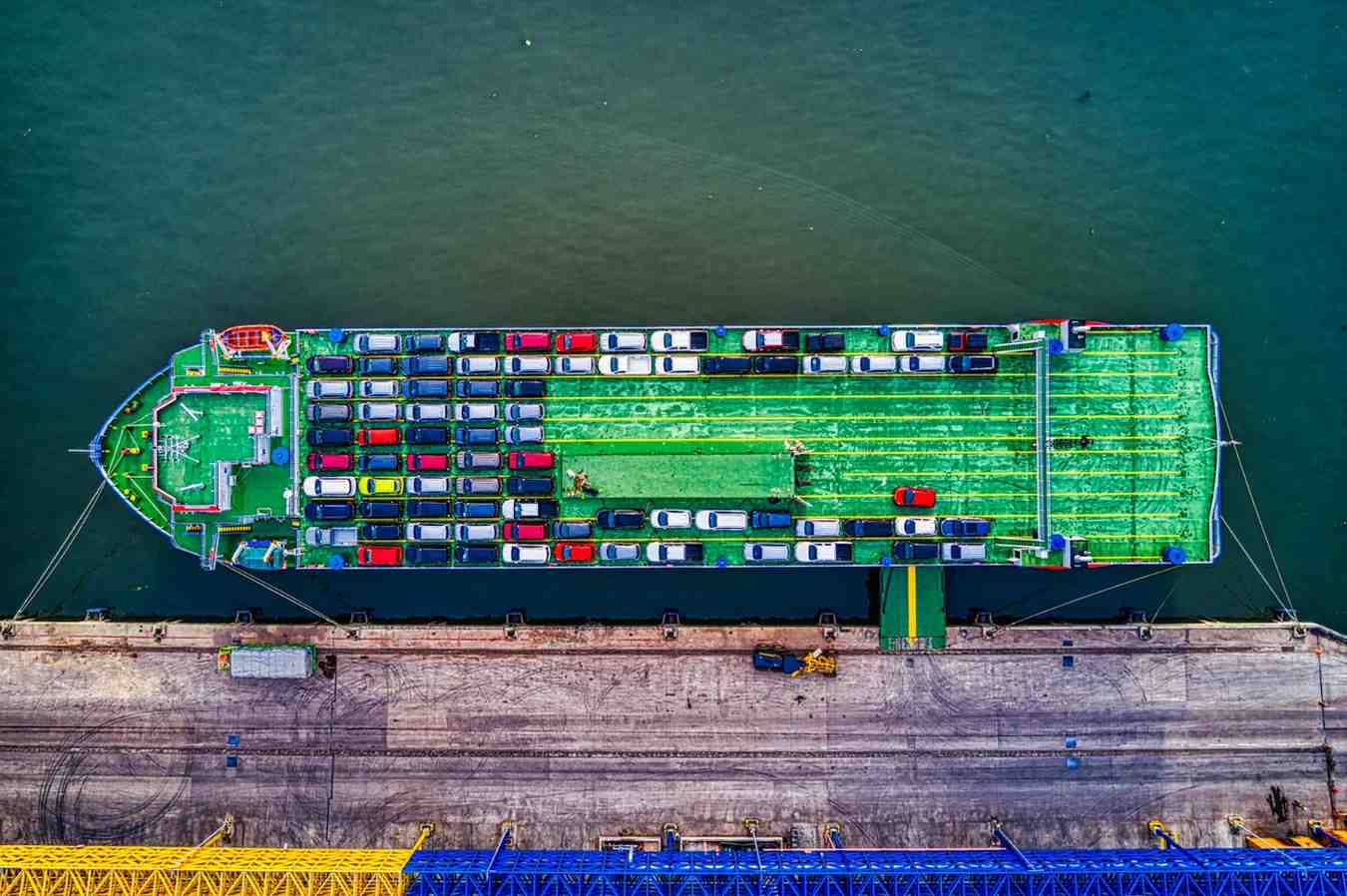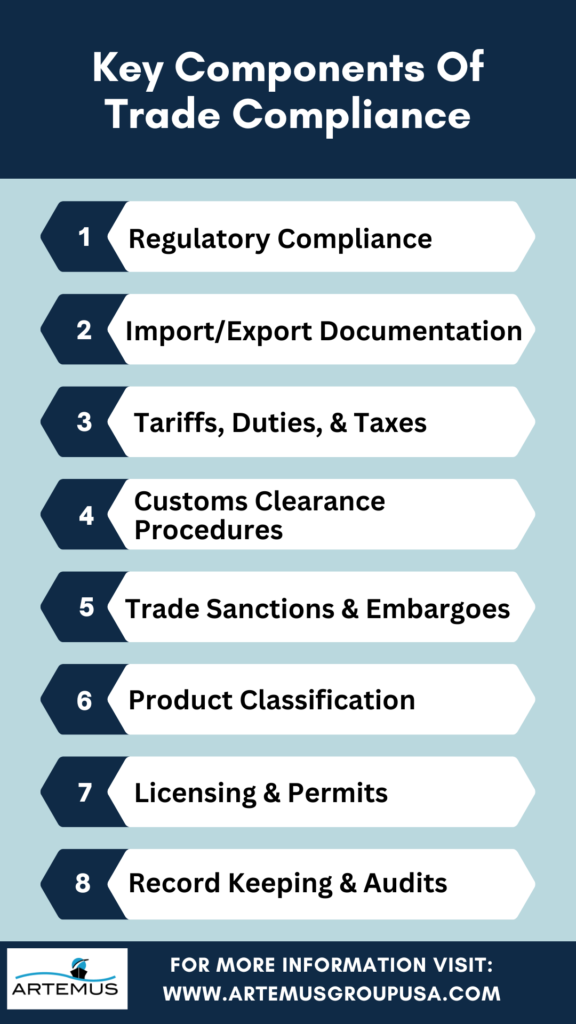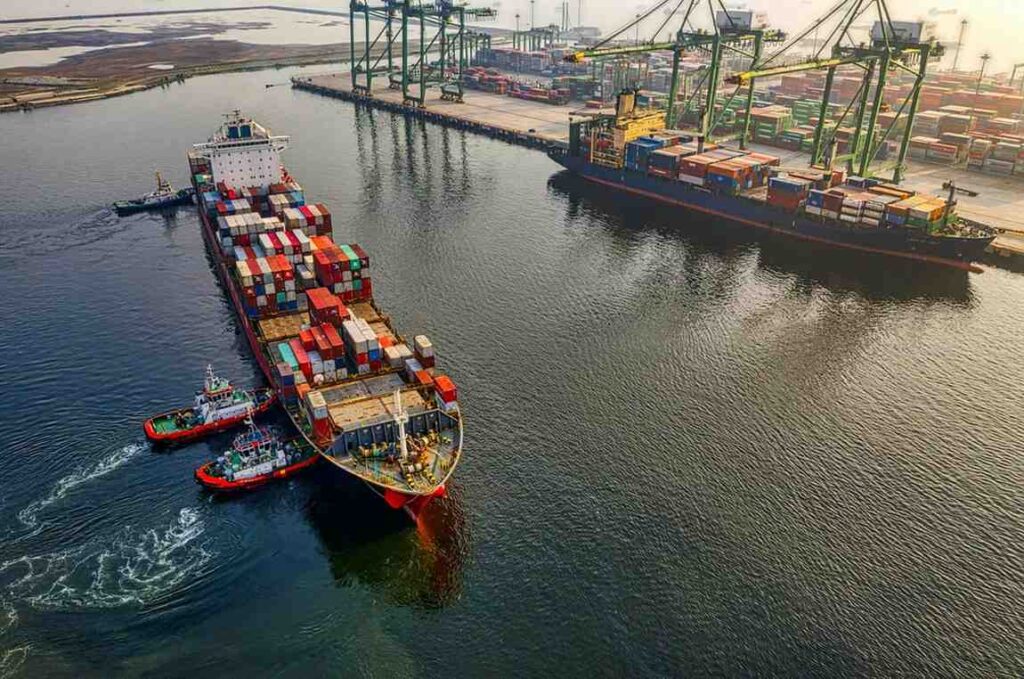
What Is Inbound Logistics & Outbound Logistics? A 2025 Guide
In the dynamic world of supply chain management, understanding the nuances of inbound and outbound logistics is crucial for operational

Navigating the complex world of global trade requires businesses to adhere to a myriad of regulations and laws governing cross-border transactions. This intricate web of international trade compliance ensures that businesses operate ethically, legally, and efficiently in the global marketplace. From customs procedures to import/export documentation, compliance with trade regulations is essential to mitigate risks and maintain integrity in trade operations.
At the forefront of providing solutions to streamline compliance efforts is Artemus Transportation Solutions. Offering advanced software solutions for Automated Manifest System (AMS) and Importer Security Filing (ISF) compliance, Artemus empowers businesses to navigate the complexities of global trade seamlessly. Let’s delve deeper into the world of global trade compliance and explore how Artemus is revolutionizing trade compliance management.
Table Of Contents
Global trade compliance refers to the adherence to regulations, laws, and protocols governing the exchange of goods and services across international borders. It encompasses a comprehensive set of rules established by governments, regulatory bodies, and international agreements to ensure fair, transparent, and lawful trade practices. Compliance with these regulations is crucial for businesses engaged in global trade to avoid penalties, fines, and reputational damage while maintaining the integrity of their operations.
Global trade compliance involves various aspects, including accurate documentation, adherence to import/export controls, compliance with tariffs and duties, and adherence to trade sanctions and embargoes. Moreover, it requires continuous monitoring, assessment, and adaptation to changing regulatory environments and market conditions.
Effective global trade compliance mitigates legal and financial risks and fosters trust and credibility among trading partners and regulatory authorities.
Related: Custom Clearance Documents Required In USA, India, & Japan

Trade compliance is a multifaceted process that involves various components aimed at ensuring businesses adhere to the regulations governing international trade. These components collectively form the framework for managing import and export activities in accordance with legal requirements and industry standards. Understanding these key components is essential for businesses to maintain compliance and mitigate risks associated with cross-border trade. Here are the primary components of trade compliance:
Regulatory compliance involves adhering to the laws, regulations, and policies established by governmental and regulatory bodies governing international trade. This includes compliance with import and export regulations, customs laws, trade sanctions, embargoes, licensing requirements, and trade agreements such as free trade agreements (FTAs) and preferential trade arrangements.
Proper documentation is crucial for facilitating smooth customs clearance and ensuring compliance with import and export regulations. Key import/export documents include commercial invoices, packing lists, bills of lading, certificates of origin, import/export licenses, and customs declarations. Accurate and complete documentation helps to prevent delays, penalties, and potential compliance violations.
Governments impose tariffs, duties, and taxes on imported and exported goods as a source of revenue and to regulate trade flows. Trade compliance requires businesses to accurately classify their goods according to tariff codes, determine applicable duty rates, and calculate taxes such as value-added tax (VAT) or goods and services tax (GST). Compliance with tariff and tax regulations is essential to avoid customs disputes and financial liabilities.
Customs clearance involves the process of verifying and approving imported and exported goods by customs authorities. Compliance with customs clearance procedures entails submitting accurate and timely documentation, paying applicable duties and taxes, and adhering to import/export restrictions and prohibitions. Efficient customs clearance facilitates the smooth flow of goods across borders while minimizing delays and disruptions.
Trade sanctions and embargoes are imposed by governments to restrict trade with specific countries, entities, or individuals for political, economic, or security reasons. Compliance with trade sanctions involves screening business partners, customers, and transactions to ensure they are not subject to sanctions lists maintained by regulatory authorities. Violating trade sanctions can lead to severe penalties and reputational damage.
Product classification involves assigning the correct Harmonized System (HS) code to goods based on their nature, composition and intended use. Accurate product classification is essential for determining applicable tariffs, duties, and regulatory requirements, as well as ensuring compliance with trade agreements and export controls. Misclassification can result in customs delays, penalties, and compliance violations.
Some goods may require special licenses, permits, or certifications to be imported or exported due to their nature, destination, or intended use. Trade compliance necessitates obtaining the necessary licenses and permits from regulatory authorities before shipping controlled or regulated goods. Failure to obtain required licenses can result in shipment delays, fines, and legal consequences.
Maintaining comprehensive records of import and export transactions, documentation, and compliance activities is essential for demonstrating compliance with trade regulations and facilitating audits by customs authorities or regulatory agencies. Effective record-keeping practices ensure transparency, traceability, and accountability in trade compliance management.
Related: How Long Does Customs Clearance Take? Key Takeaways
International trade agreements play a pivotal role in shaping the global economy by facilitating the movement of goods, services, and investments across borders. These agreements establish rules, standards, and mechanisms for trade relations between countries, aiming to promote economic growth, enhance market access, and foster cooperation among nations.
Compliance with international trade agreements is essential for businesses and countries alike, as it offers a multitude of benefits and opportunities while ensuring fair and equitable trade practices. Here are several reasons why compliance with international trade agreements is crucial:
International trade agreements often include provisions aimed at reducing trade barriers such as tariffs, quotas, and customs procedures, thereby facilitating market access for goods and services. Compliance with these agreements enables businesses to access new markets on preferential terms, expand their customer base, and increase export opportunities. By adhering to trade agreement requirements, businesses can take advantage of tariff concessions and eliminate trade barriers that hinder market entry and competitiveness.
Compliance with international trade agreements can confer a competitive advantage to businesses by providing them with access to preferential trade arrangements and level-playing-field conditions. Companies that comply with trade agreement requirements can benefit from lower tariffs, streamlined customs procedures, and enhanced regulatory harmonization, giving them a competitive edge over non-compliant competitors. Compliance also signals a commitment to fair trade practices and international standards, enhancing a company’s reputation and credibility in the global marketplace.
International trade agreements contribute to economic growth and development by promoting trade liberalization, investment flows, and regional integration. Compliance with these agreements fosters economic cooperation among participating countries, stimulates cross-border investment, and creates opportunities for job creation and income generation. By adhering to trade agreement commitments, countries can attract foreign investment, promote export-led growth, and diversify their economies, leading to sustainable development and prosperity.
International trade agreements provide a framework of rules and disciplines that govern trade relations between countries, offering legal certainty and stability to businesses engaged in cross-border trade. Compliance with these agreements helps mitigate risks associated with trade disputes, protectionism, and regulatory uncertainty, providing businesses with a predictable and conducive environment for conducting international transactions. By adhering to established trade rules and dispute resolution mechanisms, businesses can resolve trade-related conflicts efficiently and avoid disruptions to their operations.
Compliance with international trade agreements helps businesses mitigate risks associated with trade barriers, regulatory compliance, and market uncertainties. By understanding and adhering to trade agreement requirements, businesses can minimize the risk of encountering trade disputes, sanctions, or non-tariff barriers that could impede their international trade activities. Compliance also enhances supply chain resilience by promoting transparency, predictability, and legal compliance throughout the trade process, reducing the likelihood of disruptions or delays.
International trade agreements promote global integration and cooperation by fostering dialogue, collaboration, and consensus-building among participating countries. Compliance with these agreements encourages countries to work together to address common challenges, harmonize trade rules, and promote mutual understanding and respect for international norms and standards. By adhering to trade agreement commitments, countries can build trust, strengthen diplomatic relations, and foster a conducive environment for sustainable economic development and peace.
Related: Shipment Has Been Given A Release Status By Customs
While ensuring adherence to trade regulations is essential, numerous hurdles can impede the smooth execution of compliance efforts. Here are some of the most common compliance challenges faced by businesses:
Related: Customs Compliance Software: Key Benefits & Top Suggestions
Non-compliance with trade regulations can have severe repercussions for businesses, ranging from financial penalties and legal sanctions to reputational damage and operational disruptions. Given the complexity and scope of international trade laws, even unintentional violations can result in significant consequences.
Understanding the potential ramifications of non-compliance is essential for businesses to mitigate risks and maintain integrity in their trade operations. Here are some of the key consequences of non-compliance with trade regulations:
One of the most immediate consequences of non-compliance is the imposition of financial penalties and fines by regulatory authorities. Violations of import/export laws, customs regulations, or trade sanctions can result in monetary sanctions, which can vary in severity depending on the nature and extent of the violation.
Non-compliance with customs regulations can lead to delays in the clearance of goods through customs checkpoints or even the seizure of shipments by customs authorities. Incorrect documentation, misclassification of goods, or failure to comply with import/export restrictions can trigger customs inspections and result in shipment delays or confiscation of goods.
Serious violations of trade regulations may lead to legal sanctions, including civil or criminal charges against individuals or entities involved in non-compliant activities. Legal proceedings can result in court orders, injunctions, or even imprisonment for individuals found guilty of willful violations of trade laws.
Non-compliance with trade regulations may result in the loss of trade privileges, such as preferential tariff rates or participation in trade agreements. Regulatory authorities may suspend or revoke trade licenses, permits, or certifications, thereby restricting a business’s ability to engage in international trade activities.
Non-compliance with trade regulations can tarnish a business’s reputation and undermine stakeholder trust. Negative publicity surrounding compliance violations can erode customer confidence, damage relationships with suppliers and business partners, and harm the brand image of the non-compliant company.
Non-compliance with trade regulations can disrupt supply chains, leading to delays in production, distribution, and delivery of goods. Customs delays, shipment seizures, or legal disputes can disrupt business operations, increase costs, and impact customer satisfaction.
Non-compliance with trade regulations may result in exclusion from certain markets or loss of market access. Regulatory authorities in importing countries may impose import bans or restrictions on goods from non-compliant suppliers, effectively excluding them from participating in those markets.
Non-compliance with trade regulations can escalate into trade disputes between countries or between businesses and regulatory authorities. Disputes may result in formal complaints, arbitration proceedings, or litigation, which can be costly and time-consuming to resolve.
Non-compliance with trade regulations can tarnish a business’s reputation and undermine stakeholder trust. Negative publicity surrounding compliance violations can erode customer confidence, damage relationships with suppliers and business partners, and harm the brand image of the non-compliant company.
Non-compliance with trade regulations may trigger increased regulatory scrutiny and oversight by government authorities. Businesses found to be non-compliant may be subject to enhanced monitoring, audits, or investigations, leading to further scrutiny of their trade practices and compliance efforts.
Related: How To Do Custom Clearance In USA For Goods? The Process
Ensuring adherence to international trade regulations is vital for businesses involved in cross-border commerce. Implementing effective trade compliance practices not only helps mitigate risks but also enhances operational efficiency and fosters trust among stakeholders. Here are five key best practices for global trade compliance:
1. Conduct Thorough Compliance Assessments: Regularly assess your company’s compliance with international trade regulations by conducting comprehensive audits and reviews of import/export processes, documentation, and transactions. Identify potential areas of non-compliance and implement corrective actions to address deficiencies and minimize risks.
2. Establish Internal Controls & Compliance Policies: Develop and implement robust internal controls and compliance policies to govern import/export activities and ensure adherence to regulatory requirements. Establish clear procedures, guidelines, and responsibilities for trade compliance, and communicate them effectively to employees at all levels of the organization.
3. Invest in Employee Training and Education: Provide ongoing training and education programs to employees involved in import/export operations, customs clearance, and compliance management. Ensure that staff members are knowledgeable about relevant trade regulations, procedures, and best practices to enhance compliance awareness and competence.
4. Leverage Technology Solutions: Utilize technology solutions such as trade compliance software, electronic data interchange (EDI) systems, and automation tools to streamline trade compliance processes and enhance efficiency and accuracy. Implement software solutions for documentation management, customs clearance, and compliance monitoring to improve compliance outcomes and reduce administrative burdens.
5. Engage with Trade Compliance Experts and Consultants: Seek guidance and expertise from trade compliance professionals, consultants, or legal advisors to navigate complex regulatory requirements and mitigate compliance risks. Stay informed about changes in trade regulations, tariffs, and sanctions, and leverage external resources to enhance compliance strategies and practices. Collaborate with industry peers, trade associations, and government agencies to stay abreast of emerging trends and best practices in global trade compliance.
Related:Custom Clearance Charges & Fees: A Complete Guide
Artemus specializes in providing cutting-edge software solutions tailored for Importer Security Filing (ISF) and Automated Manifest System (AMS) trade compliance. Our comprehensive platform offers seamless integration and automation of ISF and AMS processes, ensuring efficient and accurate compliance with U.S. Customs and Border Protection (CBP) regulations.
With Artemus, businesses can streamline the submission of required ISF data and AMS filings, manage import documentation effectively, and mitigate risks associated with non-compliance. Our user-friendly interface and advanced features empower importers and customs brokers to navigate complex trade regulations with ease and optimize import/export operations.
The goals of global trade compliance are to ensure adherence to international trade regulations, mitigate risks associated with cross-border transactions, and facilitate the smooth flow of goods while maintaining integrity and legality in trade operations.
Global trade refers to the exchange of goods, services, and capital across international borders, involving transactions between businesses, governments, and consumers worldwide.
A Global Trade Compliance Manager oversees a company’s adherence to international trade regulations, ensuring import/export activities comply with laws and standards. They develop and implement compliance strategies, conduct risk assessments, train staff on regulations, and liaise with authorities to maintain legal compliance and minimize trade-related risks.
International trade compliance is crucial to ensure businesses adhere to laws and regulations governing cross-border transactions, mitigating risks of fines, penalties, and reputational damage while facilitating smooth trade operations and fostering trust among stakeholders.

Ensuring compliance with global trade regulations is a crucial component of international business operations, guaranteeing that companies abide by the laws and regulations governing cross-border trade. By prioritizing compliance, businesses can mitigate risks, avoid penalties, and foster trust among stakeholders.
With the ever-evolving landscape of international trade, staying informed about regulations and leveraging advanced compliance solutions is essential for success in the global marketplace. Artemus Transportation Solution’s AMS and ISF compliance software offer businesses the tools they need to navigate trade regulations effectively, streamline operations, and maintain compliance with confidence.

In the dynamic world of supply chain management, understanding the nuances of inbound and outbound logistics is crucial for operational

In today’s interconnected world, businesses rely heavily on global trade to expand their markets, access new resources, and drive growth.

Importing goods for resale in the USA presents a lucrative business opportunity, but navigating the complexities of U.S. customs regulations,
Get In Touch
Artemus’ Software Solutions for ISF, AMS, Japan AFR, eManifest Canada, & Panama B2B filings.